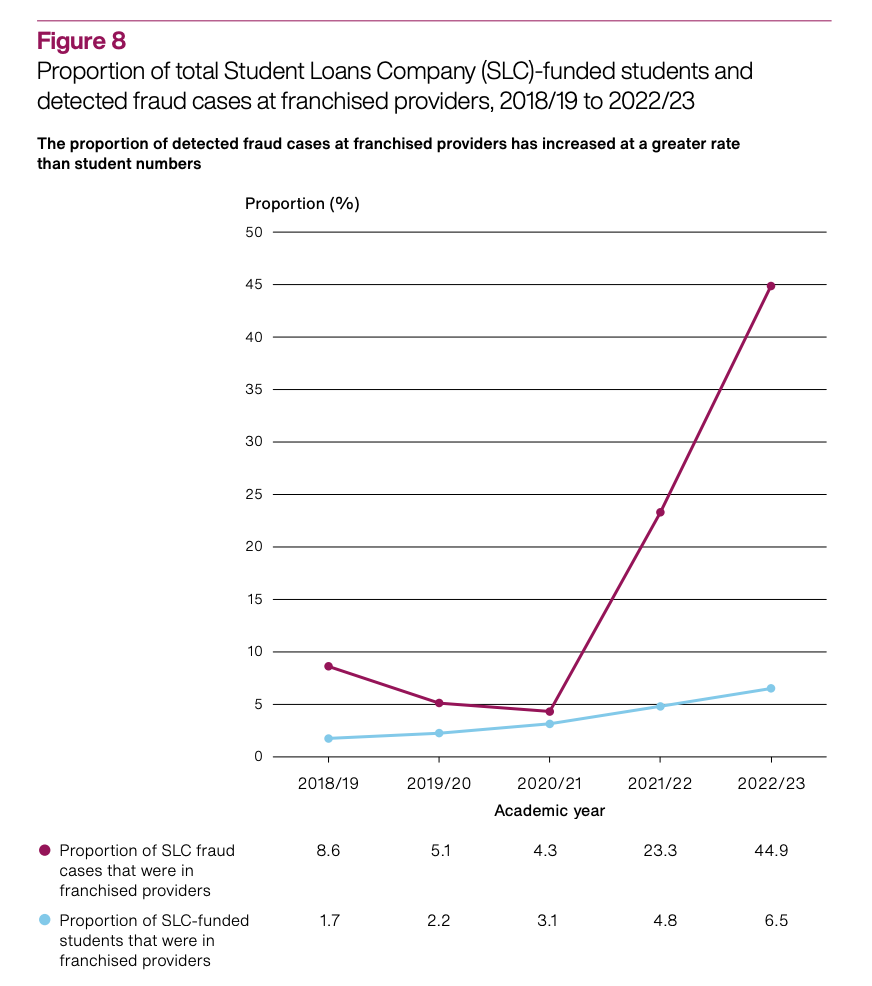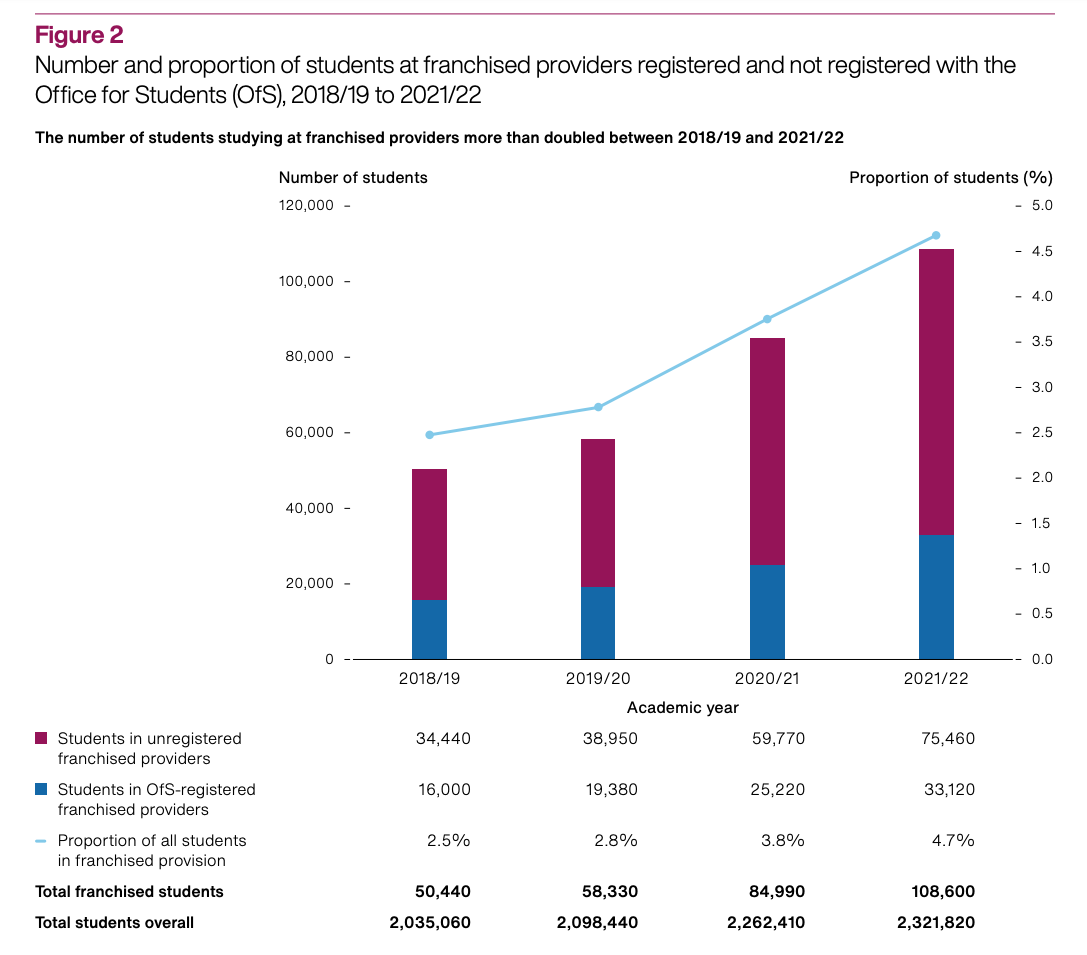Take a look at some of the recent investigations the House of Commons Public Accounts Committee has conducted: HS2, flooding preparedness, the procurement of PPE during the pandemic.
Big, contested national projects with such volume of public investment that wrapping your head around what’s actually going on is quite an undertaking. And if that’s not true of England’s student finance system, then what is?
Today sees the committee get its claws into the matter of “potential fraud and abuse” in the student loan books at franchised higher education providers, following the National Audit Office’s explosive report in January. It will be grilling Department for Education (DfE) permanent secretary Susan Acland-Hood, Office for Students (OfS) chief executive Susan Lapworth, and Student Loans Company (SLC) chief executive Chris Larmer.
The committee is one of the most important parliamentary mechanisms for holding the government to account – its previous stock take on matters relating to higher education saw both DfE and OfS come in for serious criticism.
So what should we expect the Public Accounts Committee (PAC) to ask – and what answers are needed?
Questions, questions
We saw with the House of Lords Industry and Regulators Committee inquiry that – revelations about the treatment of the OfS student panel aside – committee hearings themselves do not always bring fireworks. The PAC inquiry will lead to a report, likely later this spring, drawing on both its hearings and the written evidence submitted by interested parties earlier this year which has not yet been made public – this is probably the moment when the sparks will really fly.
We know that the committee will be particularly focused on whether there is effective oversight of the sector and the student finance systems, and on the mechanisms for fraud detection and prevention that are currently in place. It also seems clear from the call for evidence that it will be trying to work out why lessons don’t seem to have been learned from previous, similar investigations, such as the committee’s scrutiny of alternative providers in 2018 when both Gillian Keegan and Bridget Phillipson were PAC members.
The PAC’s mandate really is to follow the money. Its report on HS2 was scathing of how costs had been allowed to balloon through poor oversight. In a pocket of the higher education sector where financial returns look to show exorbitant profits, highly paid directors and large dividend payouts, the committee will have serious questions about whether this is an appropriate final destination for public spending by way of student loans. The National Audit Office (NAO) also observed that the franchising university was typically taking between 12.5 per cent and 30 per cent of the tuition fee. Again, this feels like an area where the PAC will be getting ready to do some serious digging with its “public value for money” hat on.
One headline revelation in the NAO report was that detected fraud cases at franchised providers have increased enormously, both in real terms and proportionate to student number growth.

Given that student tuition and maintenance payments for the 2023–24 academic year are by this point well under way, the committee could and should ask where DfE and SLC think this line is going – and if the data is not yet good enough, then why not.
But beyond identified fraud alone, the NAO also made a point of highlighting the rapid expansion of student numbers at franchised providers, especially at those providers not registered with the Office for Students.

Here the data as presented only goes to 2021–22. But we have already seen in the HESES data that this looks to have continued in 2022–23. And how about this academic year, and the next, since it feels unlikely that any concrete steps will be taken before then on the “additional controls” that DfE said it was considering as part of its belated HE reform consultation response. How carefully are the government and its arm-length bodies monitoring this veritable explosion in provision?
We’d expect the committee to ask what action is currently underway. OfS got ahead of the question last week by announcing that it has launched an investigation into Leeds Trinity University’s partnership provision – and it’s a little out of character for the regulator to publicly state who is being investigated while it’s still ongoing. We may well at least get some indication of how many other providers are in the regulator’s spotlight.
Jim’s article from January sets out some other questions that PAC might want to enquire about, such as why there are some providers where maintenance loans outstrip fee loans, and why this has become a problem for England rather than Scotland or Wales, especially given that similar issues have arisen before in England, both in HE and FE.
Something else that you’d want the committee to be thinking about is how this all relates to the Lifelong Learning Entitlement (LLE). There seems to have been little said or thought, at least publicly, about how the LLE is going to integrate with franchising – on one reading, franchise arrangements will be key in bringing short, vocational, chunks of higher education to the underserved former industrial areas that are the ostensible point of the plans.
We know a third category of registration is being set up to cover providers whose provision is currently financed by Advanced Learner Loans. Last week’s HEPI/Buckinghamshire New University report on franchising recommended a category of registration for franchisees – some hard thinking would be needed about how the two categories would overlap, and the ongoing delays for the LLE third category should show just how complex an undertaking this would be, involving kicking the can several years down the road.
There have also been indications of “sub-optimal core systems” at the Student Loans Company hindering the development of the LLE’s back-end – any thought that student finance systems are ready to have additional layers of controls added needs to be considered both in light of both the current technical limitations and the massive additional burden that all this forthcoming “flexibility” is going to produce.
While the sunny uplands of a successful LLE rollout are generally imagined in terms of students picking and choosing a basket of top-quality courses, the current splurge of franchising news can lead you to picture a different future, one in which students are accessing fee and maintenance loans all over the place with real difficulties in establishing robust control systems and handling all that data.
Does franchising drive access and success?
It’s probably wishful thinking to expect the PAC to delve too deeply into the raison d’etre of franchising and the specifics of future HE policy movement – it’s not really what the committee is there for. There are some more fundamental questions that both DfE and the sector need to grapple with around franchising though.
The first is around access. The official line is that “DfE considers that franchising helps widen access to higher education,” and the evidence you get for this is that the students on these courses are more likely to be from WP backgrounds.
But elsewhere in England we have an access and participation regime which, in the nicest possible way, is dragging university WP teams over hot coals to get them to rigorously prove the effectiveness of their interventions. And yet the claim that franchising and partnership provision is an important way to widen access and allow for provision in “cold spots” is repeated as a truism when there is little if any evidence base for it. Is franchising – as operating now, not as we’d like to imagine it to work – an effective way to bring skills and qualifications to underserved areas?
Simply looking at the demographic characteristics of students enrolling into franchised provision is no way to make the case that it is widening access, except for a very narrow definition of widening access that has gradually lost favour in all other parts of the sector’s work. No-one in any other arena would say that higher education is promoting social mobility simply by getting students in, with no scrutiny of the quality of provision, the student experience, and the outcomes associated with courses. So why do supporters of franchised provision seem to have a lower bar to clear?
The evidence may be there. But until it’s presented publicly it’s hard to get on board.
A plan for growth
The other issue is around growth, in student numbers, places, and variety of provision. DfE has rolled back on its early 2010s aspirations to have a growing number of alternate providers and the innovation that private higher education was said to have in store for the sector, but it’s still loosely supportive of partnership provision as the way to get higher level study into places. In that case, is it thinking properly about where and in what subjects the sector is growing? Or have we simply stumbled into a rapid expansion of largely business and management-focused provision, often – it would appear – in big cities already well served by institutions whose quality is appropriately evidenced?
Most of us in the wider community want the opportunities of higher education extended to more people, for all sorts of sensible reasons that I don’t need to go into here. It would be great if the committee would ask the government if this is the way they want it to grow – and how comfortable it is with the student loan book being marketed through TikTok and feeding chunky profit margins.
It’s not the government’s job to plan the shape of the sector, some might say – this is a slippery slope to a loss of institutional freedom and dreaded limits on intakes.
But the ongoing franchising investigation is an excellent reminder of the fact that what the student finance system enables, and how it is regulated and overseen, is a form of managing the size and shape of the sector. Just because there are certain quasi-market mechanisms in certain places does not absolve the government of responsibility for how its systems and processes create and direct demand in some directions, and limit it in others.



I agree that franchising is an invaluable tool in supporting smaller and new providers offer higher education courses, and therefore enable provision to be offered on a much wider basis than it would otherwise.
I wonder about the branch franchising model though – which sees similar conversions of offices offering similar business and management courses a few streets away from each other in a few big cities.
I also wonder about the franchising from one OfS provider to another, especially where the teaching provider is ‘Approved’, rather than ‘Approved – Fee Cap’. Parliament set up this distinction, building on the access plan system for higher fees, and this looks like a workaround. The information to students is confusing – and it’s possible to find very different descriptions on websites of what it means to be registered as a student at one provider but taught by another.
After 2012, there was a debate about ‘no-frills’ provision: what we seem to have is no-frills provision in an office block with scant resources beyond the classrooms but with the student still paying £9250. The NAO ought to be able to look at the amount being spent on educating the student. If 12.5% – 30% of the fee is kept at the franchising provider, and the teaching provider is spending money on agents and then taking a big profit margin, this seems to be working around the legislation.
There may not be fireworks at the committee this afternoon, but it’s still worth getting popcorn.
It is very hard for anyone to really argue that those students on franchised are getting the full HE experience. As Mike comments a lot of these are being delivered in surroundings that are a long way away from a University campus with all the facilities and resources that you would get at a HE campus. It is therefore very difficult to justify the charging of a full £9250.
Whilst some of this is being done to widen participation the reality is that it is mostly about making money, for both the provider sub contracting and the provider delivering.
Students at franchise partners are disadvantaged in terms of resources and experienced teaching staff compared to a university setting. There is a big gap.
Many universities rely on franchise partnerships due to the profitability they get, without it the university would not survive. Look at the financial statements of the top 10 University dealing with franchise partnerships, it’s all there. Look at the franchise college’s financial statements, its a shocking amount of profitability. They use widening access and participation as an excuse and in reality no widening of participation is really happening but widening of profitability and student debt is.
Many alternative providers have made huge profits from franchises partnerships, all profiting from tax payer money that could have be used elsewhere. Politicians should not be allowed to act as board/ governance members for educational institutions, several are. The institutions that are not registered on OfS and have political leaders associated with their parent group will they get looked at by OFS or will they get special treatment?It’s a very unfair and unethical system.
All franchise partners should be held to register with the OfS. It’s a very unfair system.
One could argue that the franchise partnerships model has devalued the higher education system in U.K. It’s all about the profitability, no values, no ethics and no standards. Everyone gets a degree even if they don’t attend, don’t pass, use essay mills or do not meet the english requirements.
All 3 responses above express the same fears and anger that I share.
Franchisee providers do not supply the Premier Division experience that might be available from the franchisors. The data that exists shows there is a negative gap beween the success and progression rates at the franchisee.
We need to learn from other academic pilot projects like the growth of XX University from Elsewhere in UK and their XX London Satallite Campus, what is likely to happen. Some of the teachers may be the same but the student composition and experience is not.
No matter how it is named or where it takes place, education on the cheap is still education on the cheap. Once the number of students at franchisee institutions gets over 10% of total student university undergraduates / taught post graduates, UK University International reputation will be down a drain.
How about a near-dormant for-profit company, with questionable promoters, getting a brand new franchise agreement from Newman University, though it is subject to NAO investigation? Do Universities care about such inquiries?
Monies exchanged with Uni insiders to get agreements? The most common model is Uni insiders engaging agents to make franchise deals with phoney providers for a fee and take a cut. When genuine providers approach the same Uni’s, they are told they are not taking any new partners.